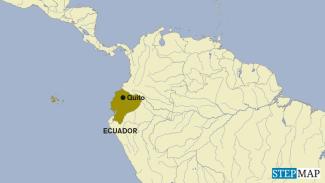Equal rights
Marrying the person you love

In a closed-door hearing in June, judges at Quito’s constitutional court ruled five-to-four in favour of same-sex marriage. They argued that homosexual couples should be allowed equal rights and that the country’s current marriage legislation was discriminatory and unconstitutional. It defined marriage exclusively as a union between a man and a woman.
The dissenting judges, on the other hand, said that any changes to the constitution should be decided and approved by the National Assembly, Ecuador’s parliament, and not the court. The parliament is required to change the laws that define marriage, but the decisions made by the constitutional court are “binding and mandatory”, clarified Gustavo Medina, a former supreme-court president.
The legal decision came after nearly two decades of work by LGBTQ advocacy groups, who waged a long battle against the Catholic Church and the Christian conservative Life and Family group. Lawyer Christian Paula of the Patka Foundation, which represents several same-sex couples seeking to marry, says that this ruling “recognises that human rights must be for all people without discrimination”.
The case was brought to the constitutional court by two same-sex couples who sued their country for their right to marry. One of the plaintiffs was Efraín Soria, who heads the LGBTQ rights group Ecuadorean Equality Foundation. After winning the case, he urges other gay people to stop hiding and “enjoy the happiness that comes from being equal”.
Ecuador’s LGBTQ movement has had some victories over the years, including a 2008 constitutional protection that prohibits discrimination based on sexual orientation and the 2015 ruling that legally recognised same-sex unions – which is not the same as marriage, though, as it does not allow same-sex couples to adopt, for example.
Nevertheless, homophobic attitudes continue to prevail in Ecuador, as they do in the whole region. Amy Lind of the University of Cincinnati, who has done a lot of research in Ecuador, cautions that the constitutional court’s verdict may only benefit the most privileged same-sex couples. “It is rare that someone will be criminally charged for assaulting an LGBTQ person,” Lind says. “On the contrary, LGBTQ people in communities that continue to oppose same-sex marriage still face being cast out of their communities.”
Iván, a 26-year-old gay student, is happy about the ruling: “It is a great moment to celebrate the victory of human rights,” he says. “Everyone should have the right to choose the partner of their choice.” However, he still prefers not to be recognised and thus does not give his surname, because he also knows that a change of law does not necessarily mean a change of attitude.
Roli Mahajan is a freelance journalist and photographer. She lives in New Delhi.
roli.mahajan@gmail.com
Link
Ecuadorean Equality Foundation – Fundación Ecuatoriana Equidad:
https://fequidadecuador.org/








